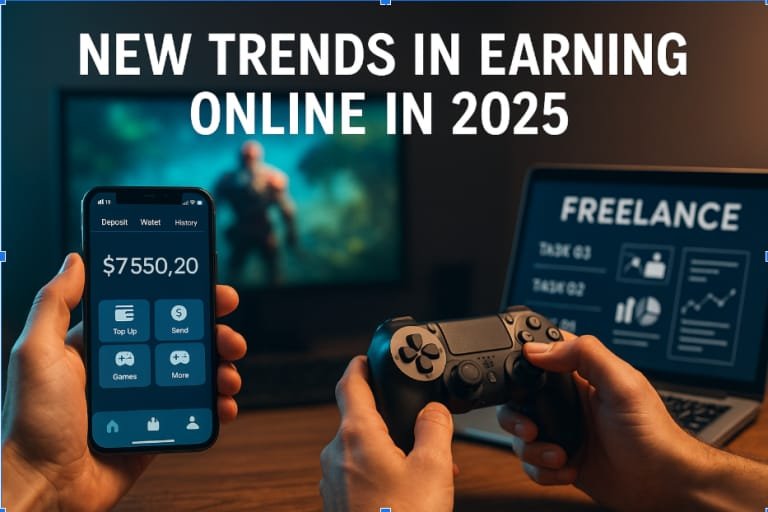New Trends in Earning Online in 2025 – Opportunities and Insights
The digital economy never pauses, and 2025 proves it again. Online income sources are growing, reaching areas that once felt untouched. From highly technical skills to platform-driven services, people now have more chances than ever to earn online. The change is quick, global, and highly rewarding.
Many are attracted by the convenience of modern platforms. Fast setup, secure payments, and simple user flows create a steady pull. Services such as https://1xbet.gm/en illustrate how online access connects users to income streams with smooth navigation. The wider digital space is built on the same model: mobile, efficient, and designed to generate returns.
Online Work and Changing Digital Habits
By 2025, online earning is part of everyday life rather than an alternative. Mobile apps, gig services, and subscriptions are now central to how people use the web.
Digital behavior is a major driver. Mobile-first activity, quick transactions, and microservices shape both how people spend and how they earn. Platforms integrating payments and work seamlessly continue to thrive.
Freelancing and Specialized Skills
Freelancing has moved far beyond side jobs. Designers, developers, and consultants work on global projects with increasing focus on niche skills. Specific expertise, not just volume, secures higher rates in 2025.
| Category | Avg. hourly rate (USD) | Growth in demand | Leading platforms |
| AI development | 60–120 | +35% | Upwork, Toptal |
| Cybersecurity | 55–110 | +28% | Fiverr Pro, Guru |
| UX/UI design | 45–95 | +24% | 99 designs, Upwork |
| Data analytics | 50–100 | +30% | Freelancer, Toptal |
| Content strategy | 40–85 | +20% | Fiverr, Contently |
These figures show one clear trend: skills tied to AI, security, and data pay better than most other fields.
Subscriptions and Creator Economy
Creators shape much of today’s digital earning system. Memberships and subscriptions dominate in video, education, and streaming. Instead of advertising alone, creators turn fans into direct supporters.
Services like paid newsletters and community platforms help small groups of loyal fans bring in steady income. Many creators now earn more from a thousand paying subscribers than from a million casual viewers.
Gaming as a Source of Income
Gaming has shifted from entertainment to a serious economic driver. Streaming, competitive tournaments, and in-game purchases all support online incomes. Mobile solutions boost this further. https://1xbet.gm/en/mobile reflects how mobile convenience pulls users into digital ecosystems. This is mirrored in gaming, where mobile integration accounts for most growth.
Digital Products and Microservices
Digital product sales are growing rapidly. Templates, learning materials, and toolkits can be distributed easily and maintained with low effort. A single product may generate passive income for years.
AI shapes how individuals make money online. From automated design tools to smart trading assistants, machine learning is central. Smart contracts on blockchain platforms replace long and complex agreements, saving time and cutting costs.
Gig Platforms and Task Work
Small task platforms continue to attract millions. Survey jobs, testing, and micro tasks remain a steady entry point for new earners.
| Platform | Avg. hourly income (USD) | Key features |
| Amazon MTurk | 3–7 | Microtasks, surveys |
| Clickworker | 4–8 | Data entry, short texts |
| Appen | 6–10 | AI training, audio work |
| UserTesting | 10–20 | Website and app testing |
| Lionbridge | 5–9 | Translation, language jobs |
Earnings are lower than freelancing, but flexibility makes them popular.
Digital assets remain part of online income in 2025. Fractional shares and stablecoins allow micro-investments starting from a few dollars. Transparency and security are stressed.
Key Highlights
The online earning market is more dynamic than ever. Four major points define 2025:
- Mobile-first models dominate across income types
- AI and automation scale productivity and efficiency
- Gaming integrates with income in new ways
- Regional differences shape unique earning approaches
Online Education and Knowledge Sharing
Teaching online is thriving. Platforms for live classes and recorded material host subjects ranging from coding to productivity tips. Beyond formal learning, niche lessons such as gaming strategies also draw steady interest. Models vary by region. Mobile-first growth leads in some areas, while subscription services dominate in others.
Earning online in 2025 is not about chance but about adaptation. From freelancing and subscriptions to AI and gaming, digital opportunities are broader than ever. Creativity, flexibility, and quick adoption of tools define who succeeds.
Okwum Uchechukwu, a Journalist, serves as Editor with the Tide Newspapers, and writes in from PortHarcourt, Rivers State.
Disclaimer: The opinion expressed in this sponsored article are strictly attributable to the author, Okwum Uchechukwu, and do not represent the TheLumineNews or it’s agent .
